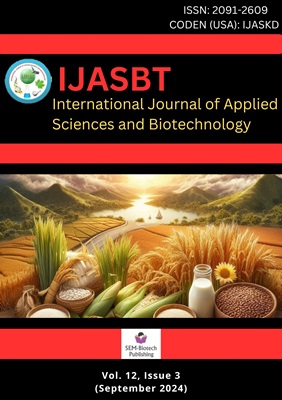Right to Food and Sustainable Food Systems in Nepal: Legal Frameworks, Achievements, and Challenges
DOI:
https://doi.org/10.3126/ijasbt.v12i3.70153Keywords:
Agrifood system, Food security, Food system, Malnutrition, Right to foodAbstract
Food insecurity remains a persistent challenge in Nepal. The right to food is a fundamental human right recognized in various international conventions and national legal frameworks. The Right to Food and Food Sovereignty Regulation was drafted by the Ministry of Agriculture and Livestock Development, Nepal, and approved by the Council of Ministers in March 2024. The introduction of legal frameworks to ensure food security and their effective implementation is one of the key action tracks identified in Nepal’s National Food System Transformation Pathway. However, several challenges hinder the effective implementation of this regulation, including the availability of financial resources, technical manpower, the establishment of fair price shops, and the technical capacity of the implementing agency. Additionally, policy coherence across government tiers, the interests of external development partners, and certain cultural factors pose significant obstacles to the successful implementation of the regulation's provisions. A comprehensive approach is required, combining legal reforms, economic support, and social initiatives, to transform the right to food from a theoretical concept into a tangible reality for all Nepali citizens. This paper highlights the key provisions, the development process of the regulation, the roles of key stakeholders, and the challenges in its effective implementation.
Int. J. Appl. Sci. Biotechnol. Vol 12(3): 115-125.
Downloads
Downloads
Published
How to Cite
Issue
Section
License
Copyright (c) 2024 International Journal of Applied Sciences and Biotechnology

This work is licensed under a Creative Commons Attribution-NonCommercial 4.0 International License.




